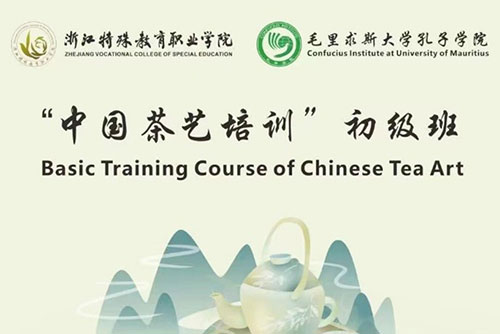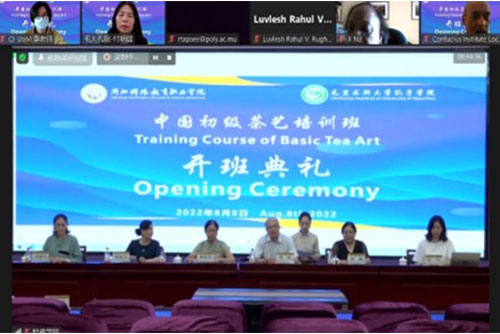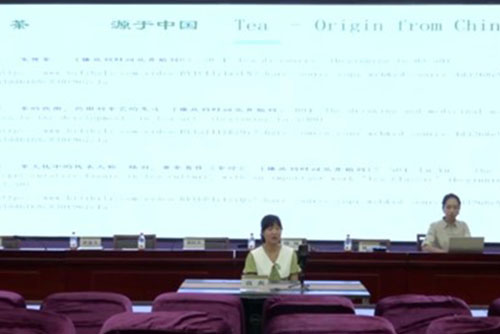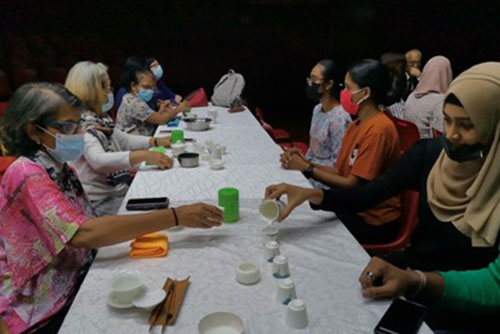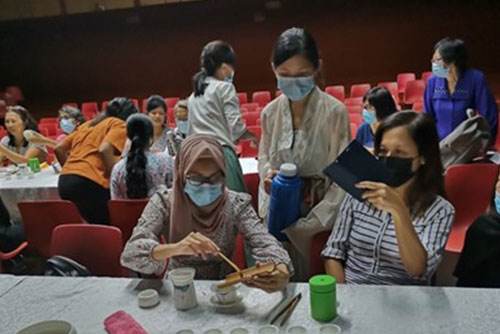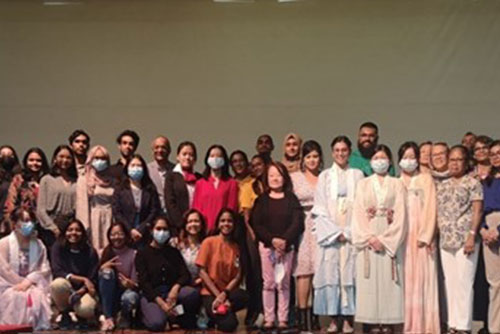On August 8, the Confucius Institute at University of Mauritius organized a Basic Training Course on Chinese Tea Culture in collaboration with Zhejiang Vocational College of Special Education. Huang Guimei, Vice President of Zhejiang Vocational College of Special Education, Fu Xiang, Director of the International Exchange and Cooperation Office of Zhejiang Sci-Tech University, and Naraindra Kistamah, Mauritian Director of Confucius Institute at University of Mauritius, attended the opening ceremony and delivered speeches. Fu Mingduan, Chinese Director of the Confucius Institute at University of Mauritius, hosted the ceremony and about 60 local participants attended the opening ceremony.
Huang Guimei, Vice President of Zhejiang Vocational College of Special Education, expressed her wishes and expectations for this training course. She said the training course would share Chinese tea culture with Mauritian participants by exposing them to the cultural tea heritage of Hangzhou and using the practical experiences of professional teachers. Also, she hopes all participants could understand and embrace the great charm of the Chinese tea culture in their practical sessions.
Fu Xiang, Director of the International Exchange and Cooperation Office of Zhejiang Sci-Tech University affirmed the positive role played by the Confucius Institute at University of Mauritius since its establishment for strengthening the friendship between the two countries. He hopes that the Confucius Institute would take this cooperation as an opportunity to improve the educational and cultural cooperation between China and Mauritius. Director Fu Xiang expects that all participants could learn and appreciate the beauty of Chinese tea culture from this training course.
Naraindra Kistamah, Mauritian Director of Confucius Institute at University of Mauritius, shared with participants his understanding of Chinese tea culture and expressed his sincere appreciation of Chinese culture. He thinks that tea has taken a special place in traditional Chinese culture. Tea does not only have practical significance, but also has irreplaceable spiritual significance, and helps people to cleanse their mind and improve their spiritual well-being.
The training course consisted of two parts: online lectures on Chinese tea culture and onsite practice of tea art. Shang Yan, the sixth generational heir of the public welfare family of Westlake Longjing tea, Master from Zhejiang University Tea Institute, introduced the origin, history, and diversity of Chinese tea, as well as the spiritual meaning of the tea ceremony through various short videos. Participants had a comprehensive understanding of Chinese tea culture and generated a keen interest in it. During the Q&A part of the online session, the participants raised many practical questions about tea making, tea drinking, tea classification, storage, and the benefits of different types of tea. The online exchange was full of excitement and everyone showed his or her deep appreciation of Chinese tea culture.
The onsite practical training was conducted in the auditorium of the University of Mauritius. The participants followed the virtual practical instruction and practiced accordingly. Jiang Yufang, Head of Tea Art and Tea Culture at Zhejiang Special Vocational Education Institute, gave detailed demonstrations and explanations of standing and seating etiquette to each aspect of the tea ceremony. The participants watched and followed the instructions attentively. During the tea making session, everyone participated and tried to reproduce each step as accurately as possible. Under the explanation and guidance of the teachers at Confucius Institute, the participants gradually understood the basic rules of tea ceremony. All the participants learned to offer tea to each other in Mandarin: "Please drink tea". Enjoying the fragrance of tea, everyone was fascinated by the elegant aspect of Chinese tea art.
This training was a positive and successful attempt to cooperate between overseas Confucius Institutes and Universities in China during the pandemic. The Confucius Institute at University of Mauritius takes this opportunity to make full use of the rich language and cultural teaching resources in China, and to enhance cultural exchanges and cooperation between China and Mauritius.

